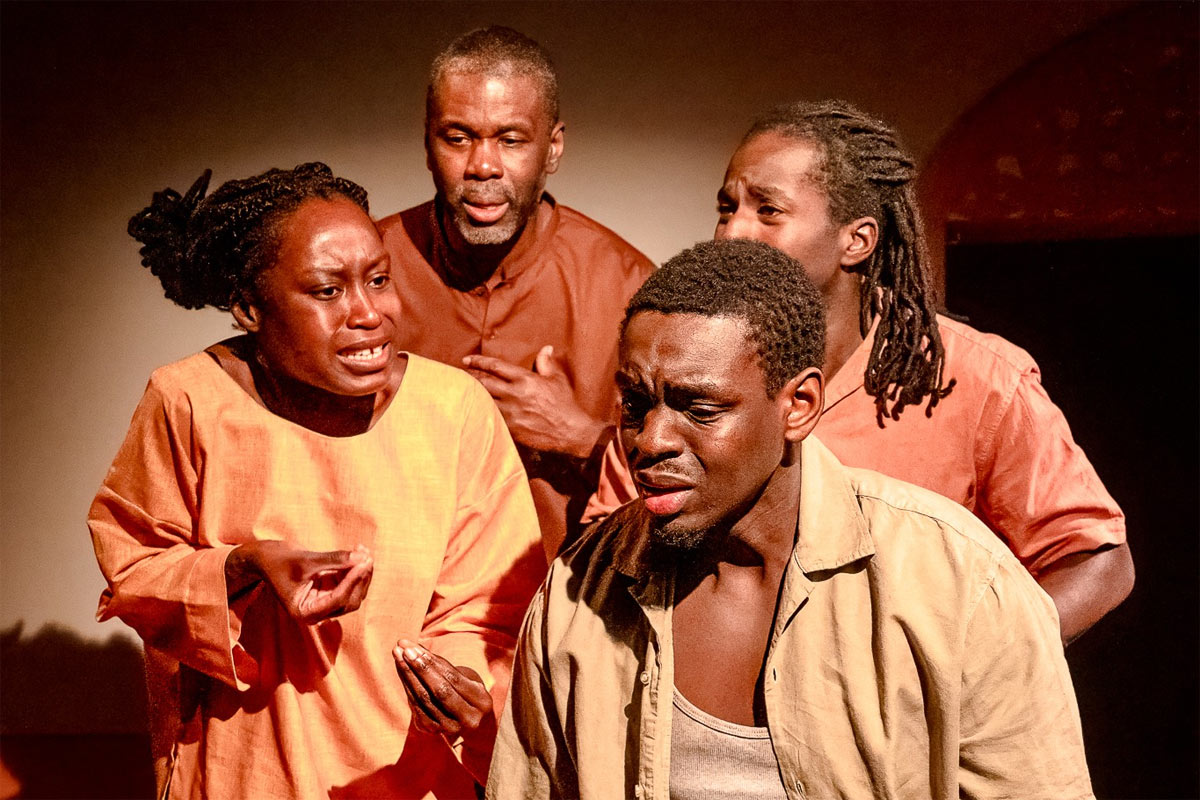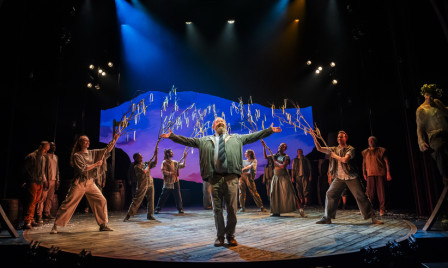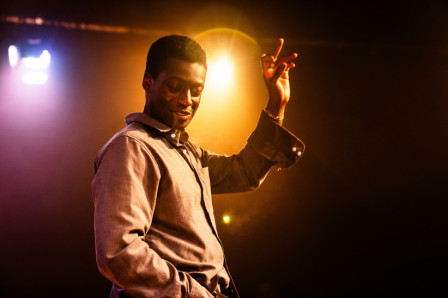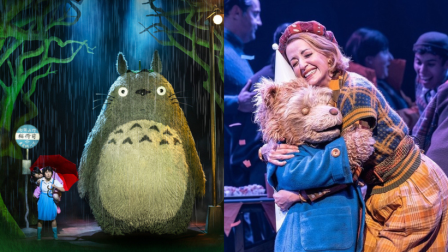Review: LITTLE BROTHER at Jermyn Street Theatre
In what must count as one of the more unusual pieces of theatre currently available to Londoners, the diminutive subterranean stage at Jermyn Street basks in the russets and orange sand colours of North Africa for a beguiling human interest piece titled LITTLE BROTHER.
 The cast of Little Brother at Jermyn Street Theatre. Photo by Steve Gregson.
The cast of Little Brother at Jermyn Street Theatre. Photo by Steve Gregson.
Adapted for the stage by Timberlake Wertenbaker from the story recorded by Amets Arzallus Antia of Ibrahima Balde’s extraordinary early life, the piece is more of a free-flowing narrative tale than a mere conventional play.
Central to the story and on stage for almost the entire running time, is Ibrahima (played with a searing honesty by Blair Gyabaah). Barely a teenager, he is learning the shoe trade from his father (Mo Sesay) who one morning doesn’t wake up. With a younger brother, two sisters and a mother to help, he is conscious of his new role as eldest male of the household and heads from Guinea to seek work in neighbouring Liberia. One day he receives a call from his concerned mother (Whitney Kehinde), that his brother (Ivan Oyik) has not been home for days. Eventually they learn the youngster has travelled through the desert to Libya where he hopes to get passage to Europe. The play essentially recounts Ibrahima’s journey to try and find his little brother and the people and situations he meets along the way who are all played by the 4 other cast members.
It would be fair to observe that despite some kindly and friendly encounters, in the main, anyone involved in maintaining border security whether it be in Mali, Algeria, Libya, Morocco or Spain is less that receptive to undocumented migration. More receptive to the opportunities which people trafficking presents, are the rogues and villains who operate in the shadows and on the migration routes.
Directed by Stella Powell-Jones on a set by Natalie Johnson which uses a few simple elevations to convey locations and scenarios, we journey with Ibrahima from a small town to a desert prison, building sites, refugee camps and Mediterranean beaches as his odyssey progresses. Periodically he breaks from the chronological presentation to sit reflectively with Amets Arzallus Antia (Youness Bouzinab) to whom, over a period of many months, he recounts his story and the journey which took him from a Guinea backwater in West Africa to the bustling city of Madrid. Some of the intervening detail is difficult to hear and paints a gloomy and oft-depressing picture of man’s greed and inhumanity. But there are glimmers too (in the sharing of food and guidance) of unquestioning kindness, generosity of spirit and other qualities which give humankind hope, in a world of seeming selfishness and cruelty.
LITTLE BROTHER plays at Jermyn Street Theatre until 21st June.
Latest News

 Full cast announced for SEA WITCH at Theatre Royal Drury Lane
10 February 2026 at 10:49
Full cast announced for SEA WITCH at Theatre Royal Drury Lane
10 February 2026 at 10:49

 THE UNLIKELY PILGRIMAGE OF HAROLD FRY at Theatre Royal Haymarket - Production images released
10 February 2026 at 10:30
THE UNLIKELY PILGRIMAGE OF HAROLD FRY at Theatre Royal Haymarket - Production images released
10 February 2026 at 10:30

 Review: MILES at Southwark Playhouse (Borough)
10 February 2026 at 10:10
Review: MILES at Southwark Playhouse (Borough)
10 February 2026 at 10:10

 The Best Family Show in London: My Neighbour Totoro or Paddington the Musical?
10 February 2026 at 09:12
The Best Family Show in London: My Neighbour Totoro or Paddington the Musical?
10 February 2026 at 09:12